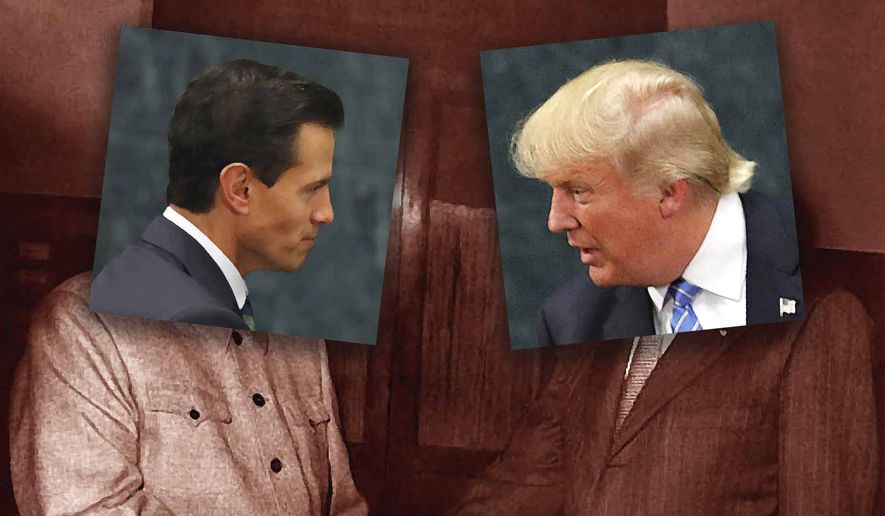OPINION:
Prior to being elected president, Richard Nixon built his political career on being a staunch opponent of communism. He had run for Congress in 1946 on an anti-communist platform, exposed senior State Department official Alger Hiss as a top-level spy for the Soviet Union, and as vice president, debated Soviet Premier Nikita Khrushchev on the merits of capitalism versus Marxism in the famous “Kitchen Debate” of 1959.
That principled position gave him the unimpeachable credibility to visit communist China as president in 1972, which led to the famous rapprochement with the United States that changed the world.
Similarly, Donald Trump catapulted to the front of the Republican primary pack after making common sense and long-overdue comments about illegal immigration and the damage it does to the American worker and broader economy, our cultural fabric and the rule of law.
“When Mexico sends its people, they’re not sending their best,” he said in his June 2015 presidential announcement speech. “They’re not sending you. They’re sending people that have lots of problems, and they’re bringing those problems with us. They’re bringing drugs. They’re bringing crime. They’re rapists. And some, I assume, are good people.”
Holy hell then broke loose because he spoke the truth in brutally honest — if indelicate — terms. You aren’t supposed to do that in modern-day America where every place is a Candyland safe space of rainbows and puppies.
Mr. Trump’s raw analysis of the catastrophic consequences of unchecked illegal immigration helped to win him the Republican nomination and ultimately, earned him an invitation to speak with Mexican President Enrique Pena Nieto — in Mexico.
Mr. Trump’s unwillingness to back down in the face of the jackbooted word and policy police made his visit and his major address on the subject so critically important. Just as Mr. Nixon was the only leader who had the anti-communist credentials to open relations with Beijing, Mr. Trump is the only one who could go to Mexico, speak hard truths to the Mexican president to his face, then return to Arizona to detail a specific plan to end the chaos.
If elected, Mr. Trump vowed to halt illegal immigration, build a wall on the southern border, deport violent criminal aliens “on Day One,” end sanctuary cities and the jobs-benefits magnet, renegotiate bad trade deals, deny amnesty, impose extreme vetting of those coming from regions compromised by Islamic terror and other dangerous ideologies, and embrace a skills-based legal immigration policy.
Ambitious, given the forces on the right and the left opposed to such a comprehensive, America-first approach? Sure. But nobody has ever accused Mr. Trump of being unambitious.
Perhaps the most important thing Mr. Trump accomplished both in Mexico and in his speech is that he shattered two previously accepted premises: one, that non-citizens have a right to enter and stay in the country, and two, that once here, we owe them proactive resolution.
To the non-citizens who would like to enter the country, Mr. Trump stated a common-sense, legal truth: They have no right to be here, and we are under no obligation to let anyone in. America’s immigration laws do not exist for compassion or empathy, as lovely as those sentiments are. They exist to serve America’s national interests. And that’s what he intends to enforce.
To the millions of illegal immigrants already here, Mr. Trump turned the accepted premise that we owe them resolution for violating the law on its head: We will no longer allow the country to be held hostage to the desired future votes of these people. That kind of political extortion will end with his election: Those here illegally will get neither the vote nor amnesty nor citizenship. If they want a positive change to their status, they must leave the country and return legally. That’s constitutional resolution.
By offering a rational defense of a rational policy that commands majority support, Mr. Trump changed the nature of the race.
He not only mastered the coveted “optics” of “looking presidential” on the international stage, he gave a bold, detailed, unapologetic speech grounded in American interests and in protecting the American people.
In the most dramatic moment of his address, he put a face on the darkest side of illegal immigration by inviting several Angel Moms — parents who have lost children to violent illegal aliens — to join him onstage. It was a powerful, emotional scene, which illuminated his case better than the pointed statistics. Those moms are the statistics.
Mr. Nixon’s visit to China shook the world. Mr. Trump’s visit to Mexico may end up having a similar effect. Following their bilateral meeting, Mr. Nieto acknowledged that trade deals like NAFTA could be renegotiated and the border addressed differently.
If Mr. Trump the nominee is already changing foreign governments’ tunes, imagine what Mr. Trump the president will be able to accomplish.
• Monica Crowley is editor of online opinion at The Washington Times.




Please read our comment policy before commenting.